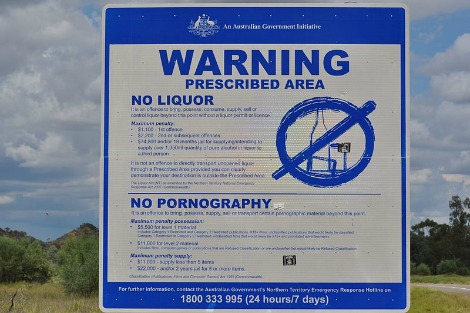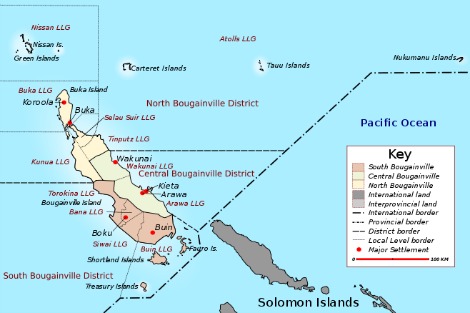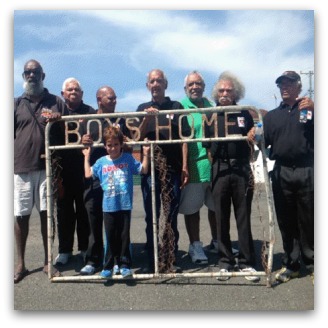Keywords: Stolen Generations
-

MARGARET DOOLEY AWARD
- Callum Denness
- 25 September 2013
3 Comments
Following the abuse received by Adam Goodes from a teenage spectator in the AFL's Indigenous round, and the subsequent remarks made by Eddie McGuire, the country became embroiled in a debate about racism in modern Australia. Meanwhile, the Northern Territory introduced its Mandatory Alcohol Treatment Bill which, if passed, will see more Aboriginal people incarcerated. We were too busy describing the modern face of racism to notice.
READ MORE 
-

AUSTRALIA
- Frank Brennan
- 07 September 2013
12 Comments
How clever of you to choose the day of the federal election for me to offer these reflections. I come amongst you, not as a publisher or journalist but as an advocate in the public square animated by my own religious tradition as a Jesuit and Catholic priest engaged on human rights issues in a robustly pluralistic democratic society.
READ MORE
-

INTERNATIONAL
- Ellena Savage
- 02 August 2013
1 Comment
Even more disturbing than PNG's poverty and gender-based violence is its military and police human rights record. Evidence of abuses in the form of a military blockade, massacres, rape and torture during the Bougainville Crisis of the 1990s are well-documented. The history of this crisis reveals PNG as incapable of caring for its most vulnerable citizens due to systemic corruption.
READ MORE 
-

AUSTRALIA
- Michael Mullins
- 01 July 2013
22 Comments
Kevin Rudd told colleagues during the week that he would not 'lurch to the left' on asylum seekers. Foreign minister Bob Carr was on message when he said there's been a change and most boat arrivals are now economic migrants rather than genuine asylum seekers. He is boldly asserting that the Rudd Government's moral credentials are intact by framing boat arrivals as a law and order matter and not a moral issue.
READ MORE 
-

AUSTRALIA
Present members of missionary orders, when writing up the story of their predecessors, tend to present these pioneer missionaries as enlightened men and women suffering hardship to spread the gospel. The destructive effect of the approaches taken by some missionaries does not negate the good work of many others. But it is part of the story and should be told.
READ MORE 
-

AUSTRALIA
- Andrew Hamilton
- 30 May 2013
6 Comments
To lead to reconciliation, each group must make space in their imagination for a realistic view of the terrible events that divided them and of who was responsible. They must also make space for a realistic view of the enduring consequences of these actions, and share a hopeful vision of what reconciliation might mean for their society.
READ MORE 
-

AUSTRALIA
- Michael Mullins
- 27 May 2013
3 Comments
The most memorable lines of Paul Keating's 1992 Redfern Speech are not about Indigenous Australians at all, but Europeans who stole their land, their children and their dignity. A number of commemorative days focus on the needs and rights of Aboriginal and Torres Strait Islander people, but Sorry Day is not one of them.
READ MORE 
-

RELIGION
- Frank Brennan
- 27 February 2013
15 Comments
Let's not underestimate the significance of John Howard's successor giving credit to Paul Keating for his Redfern speech, before invoking New Zealand's Treaty of Waitangi and calling for atonement. Still there is plenty of work to be done to attain proper constitutional recognition of Indigenous Australians.
READ MORE 
-

AUSTRALIA
- Mark Green
- 14 February 2013
4 Comments
I was in Dili on Apology Day 2008, and wept as I listened on the radio to the Apology offered by Kevin Rudd. The previous year, I had arrived in Dili to take up a post with an aid and development program, and was accosted by a very angry young man. 'What are you doing here? Have you come to make us like your Aboriginal people?'
READ MORE 
-

AUSTRALIA
- Melissa Brickell
- 13 February 2013
14 Comments
When Kevin Rudd delivered the Apology five years ago today, the Stolen Generations and their supporters wept. But we should not dwell on the Apology while there is much to be done. The denial of natural justice through compensation for genocide is a selfish decision with moral implications.
READ MORE 
-

RELIGION
- Frank Brennan
- 29 October 2012
'Though land rights and self-determination provide no utopia for the contemporary indigenous Australian community, they have belatedly put right an ancient wrong. The cost and inconvenience are unavoidable. Terra nullius is no longer an option.' Full text is from Fr Frank Brennan's keynote speech at the Central Queensland Law Association Conference, Mercure Capricorn Resort, Yeppoon, 27 October 2012.
READ MORE
-

RELIGION
- Frank Brennan
- 17 October 2012
1 Comment
Full text from Fr Frank Brennan SJ's address 'Advancing human rights in Australia — lessons from the National Human Rights Consultation' at the 'Human Rights Matters!' conference marking Anti-Poverty Week 2012. 17 October 2012, Cardinal Knox Centre, St Patricks Cathedral, Melbourne.
READ MORE